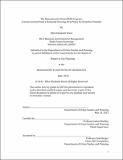The Massachusetts HomeBASE Program : lessons learned from a statewide housing-first policy for homeless families
Author(s)
Ward, Ellen Elizabeth
DownloadFull printable version (405.1Kb)
Alternative title
Lessons learned from a statewide housing-first policy for homeless families
Other Contributors
Massachusetts Institute of Technology. Dept. of Urban Studies and Planning.
Advisor
James Buckley.
Terms of use
Metadata
Show full item recordAbstract
Massachusetts is the only state in the US to maintain an emergency shelter entitlement for homeless families with its own dedicated line item in the state budget. However, in the last decade that line item has increased by 134%. In fiscal year 2011, Massachusetts spent more money on homeless services while at the same time serving more families through the Emergency Assistance (EA) system than ever before. In an attempt to rein in the cost and volume of participants in the system, the state underwent a major reform that culminated in the launch of a new program, HomeBASE, on August 1st, 2011. The program adopted a housing-first approach to serving families at imminent risk of homelessness that offered financial assistance for families to secure their own housing unit rather than entering an emergency shelter. This thesis looks at the implications of the housing-first policy shift and determines whether the program was able to achieve its intended goals: to reduce the cost and volume of the EA system. I find that the costs associated with offering 12-months of rental assistance are less than half of the average cost of serving a family in EA shelter. However, the savings are partially offset by the increase in demand for assistance when offering a housing subsidy instead of emergency shelter. To understand the reasons for the increased demand, I compare families enrolled in HomeBASE to EA shelter families from previous years to determine which, if any, factors contributed to demand. I find that HomeBASE did not attract a different population of families but merely more of the same. Using this analysis I make recommendations for how the state can modify the program using targeting tools and stabilization services to achieve its intended outcomes. These recommendations are relevant for other homeless policymakers and service providers as more and more programs adopt a housing-first approach to homelessness.
Description
Thesis (M.C.P.)--Massachusetts Institute of Technology, Dept. of Urban Studies and Planning, 2012. This electronic version was submitted by the student author. The certified thesis is available in the Institute Archives and Special Collections. Cataloged from student submitted PDF version of thesis. Includes bibliographical references (p. 74-80).
Date issued
2012Department
Massachusetts Institute of Technology. Department of Urban Studies and PlanningPublisher
Massachusetts Institute of Technology
Keywords
Urban Studies and Planning.